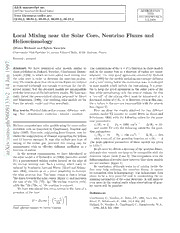
Local Mixing near the Solar Core, Neutrino Fluxes and Helioseismology PDF
Preview Local Mixing near the Solar Core, Neutrino Fluxes and Helioseismology
A&A manuscript no. (will be inserted by hand later) ASTRONOMY AND Your thesaurus codes are: ASTROPHYSICS 02.04.2; 06.01.1; 06.05.1; 06.09.1; 06.18.2 1.2.2008 Local Mixing near the Solar Core, Neutrino Fluxes and Helioseismology Olivier Richard and Sylvie Vauclair Observatoire Midi-Pyr´en´ees 14, avenueEdouard Belin, 31400 Toulouse, France Received ; accepted 7 9 9 Abstract. We have computed solar models similar to The comparisonsofthe u=P/ρ function in these models 1 thosepublishedinRichard,Vauclair,Charbonnel,Dziem- and in the seismic Sun as a function of radius are unsat- n bowski (1996), in which we have added local mixing near isfactory. The very good agreement obtained by Richard a the solar core in order to decrease the neutrino produc- etal(1996)forthemodelsincludingmicroscopicdiffusion J tion.Theresultsshowthattheneutrinofluxesarereduced and a mild mixing below the convectionzone is destroyed 4 as expected (although not enough to account for the ob- in most models which include the coremixing. Itis possi- 1 served values), but the obtained models are incompatible ble to keep the good agreement in the outer parts of the withtheinversionofthehelioseismicmodes.Wehavespe- Sun while perturbating only the central regions: for this 2 v cially tested the parametrized mixing proposed by Morel a “cut-off” of the mixing effect must be introduced at a 3 and Schatzman(1996).The resulting solarmodels arefar fractionalradiusofr/R⊙ =.4.However,eveninthiscase, 3 from the seismic model and thus unrealistic. the u values inthe core areincompatible with the seismic 1 Sun (figure 2). 9 Keywords:Physicaldataandprocesses:diffusion-mix- Here we show the results obtained for two different 0 6 ing - Sun : abundances - evolution - interior - rotation models, model T2 (similar to model 20431 in Morel and 9 Schatzman 1996) with the following values for the gaus- / sian parameters: h p Wehavecomputednewsolarmodelsusingthesamestellar rc/R⊙ = .2 D0 = 1000 cm2s−1 ∆/R⊙ = .04 - and model T3 with the following values for the gaus- o evolution code as described in Charbonnel, Vauclair and sian parameters: r Zahn(1992).This code,originatingfromGeneva,nowin- st cludes the computation of element segregationfor helium rc/R⊙ = .15 D0 = 100 cm2s−1 ∆/R⊙ = .025 a and 12 heavier isotopes. It may also include any type of with a cut-off of the gaussian function at r/R⊙ = .4 v: mixing of the stellar gas, provided this mixing may be The main physical parameters of these models are given Xi parametrised with an effective diffusion coefficient as a in table 1. Inallcasesweobtainadecreaseoftheneutrinofluxes, function of radius. r althoughthey remaintoolargeto be compatible with the a In the present computations, we have introduced in detectionvalues(table 2and3).Thecomparisonwiththe the solarmodel4ofRichardetal(1996)(hereaftermodel helioseismologicalresultsshowhoweverthatthesemodels T1) a parametrized mixing region located at the edge of are not realistic (figure 2). the nuclear burning core. Such a mixing, which could be In conclusion, although some local mixing inside the induced by Stochastic Internal Waves (Morel and Schatz- Sun may help reducing the neutrino fluxes, it cannot man 1996), remains as an a priori possibility to decrease be reconciled with helioseismology. The helioseismic data the solar neutrino flux. The basic reason is that it brings prove to be a very powerful tool in constraining the re- 3 Hedowntowardsthesolarcenter(figure1)andincreases maining parametersofthe solarstructure.Itwill improve 3 3 4 the rate of the He ( He, 2p) He nuclear reaction yield, even more in the centralparts when observations ofgrav- 3 4 7 while the He ( He,α) Be reaction is reduced. ity waves will be possible. We haveintroducedthis extra-mixingin the formofa gaussian, of the type: References D =D0exp − r−rc 2 CMhoarrebl,oPn.n,eSl,chCa.t,zVmaaunc,laEir.,,S19.,9Z6,ahAn&,AJ.P3.1,01,999822, A&A255, 191 2∆ " (cid:18) (cid:19) # Richard,O.,Vauclair,S.,Charbonnel,C.,Dziembowski,W.A., Send offprint requests to: SylvieVauclair 1996, A&A 312, 1000 2 Olivier Richard and SylvieVauclair Table1.Mainphysicalparametersofthethreemodels,atthe base of theconvectivezone and at the center. model rcz/R⊙ Tcz ρcz Yc Xc Tc ρc (106K) (g.cm−3) (106K) (g.cm−3) T1 0.717 2.162 0.185 0.6431 0.3368 15.63 154.17 T2 0.724 2.060 0.156 0.5687 0.4113 14.96 127.05 T3 0.717 2.151 0.181 0.6337 0.3462 15.45 148.93 Table2.Gaussianparametersandneutrinofluxesforthethree models. model rc/R⊙ ∆/R⊙ D0 φ(8B) (φσ)Cl (φσ)Ga (cm2s−1) (106 cm2 s−1) (SNU ) (SNU ) S S T1 - - - 6.06 8.14 130.84 T2 .20 .040 1000 2.60 3.90 108.75 T3 .15 .025 100 3.85 5.45 115.80 Table 3.Detectedvaluesofthesolarneutrinofluxes(”VIIIth Rencontresde Blois”, in press). φ(8B) = 2.80 ± 0.19 ± 0.33 ×106 cm2 s−1 (φσ)Cl = 2.54 ± 0.14 ± 0.14 SNUS Sage: (φσ)Ga = 72+−1120+−57 SNUS Gallex: (φσ)Ga = 69.7 ± 6.7+−34..95 SNUS ThisarticlewasprocessedbytheauthorusingSpringer-Verlag LATEX A&A stylefile L-AA version 3. Olivier Richard and SylvieVauclair 3 Fig. 1.Abundanceprofilesforsomeelementsinthethreemodels(Themassfractionsaremultipliedby250for3He,by200for 12C, by 100 for 13C, by 140 for 14N and by 75 for 16O): graph (a) for model T1; graph (b) for model T2; graph (c) for model T3. 4 Olivier Richard and SylvieVauclair 000...000444 000...000222 000 ---000...000222 ---000...000444 ---000...000666 ---000...000888 000 000...222 000...444 000...666 000...888 111 Fig. 2. Difference between the u= P deduced from helioseismology and the computed one. The ordinates represents: ρ ∆u = u (seismic)−u (model). Sol(cid:0)id line:(cid:1)model T1; dashed line: model T2 ; dotted line: model T3. These two last models, u u (seismic) which includelocal mixing nearthe solar core, are not compatible with thehelioseismic results.
